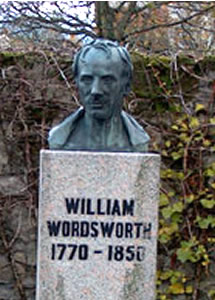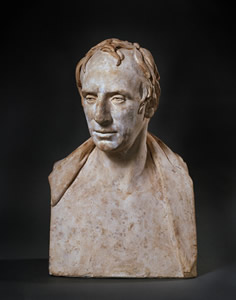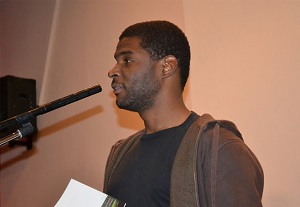De Franse schrijver Hervé Bazin werd geboren in Angers op 7 april 1911. Zie ook alle tags voor Hervé Bazin op dit blog.
Uit: Vipère au poing
« Mais, soudain, un hurlement déchira mes premières réflexions scientifiques et, de la fenêtre de la peu courageuse Mlle Ernestine Lion, tomba cet ordre épouvanté :
— Voulez-vous lâcher cela tout de suite ! Puis, en crescendo tragique :
— Ah ! le malheureux enfant !
Je restai perplexe. Quel drame ! Appels, exclamations entre croisés, affolement de talons par les escaliers. « Madame ! Monsieur l’abbé ! Par ici ! » Où sont les autres ? Aboiement de Capi, le chien (nous avons déjà lu Sans famille). Cloches. Enfin grand-mère, aussi blanche que sa guimpe, poussant du bout de sa bottine son éternelle longue robe grise, jaillit de la porte d’honneur. En même temps surgissaient de la bibliothèque, aile droite, la tante Thérèse Bartolomi, comtesse de l’Empire, puis mon oncle le protonotaire apostolique et, de la lingerie, aile gauche, la gouvernante, la cuisinière, la femme de chambre… Toute la famille et ses satellites débouchaient des innombrables issues de La Belle Angerie, cette grande garenne.
Prudente, à la vérité, la famille ! et formant cercle aussitôt, à bonne distance de la vipère, qui tournoyait toujours au bout de mes doigts et à qui le mouvement prêtait une suprême apparence de vie.
TANTE THERESE. — est-elle morte ?
LA BONNE. — J’espère que c’est une couleuvre.
LA GOUVERNANTE. — N’approchez pas, Frédie !
LA CUISINIERE, sourde et muette. — Krrrrrhh !
L’ABBE. — Je te promets une de ces fessées…
GRAND-MERE. — Voyons, mon chéri, lâche cette horreur !
Impavide, glorieux, je tendis mon trophée à l’oncle protonotaire, qui, professionnellement ennemi des reptiles, recula d’un bon mètre. Chacun l’imita. Mais grand-mère, plus brave, parce que, n’est-ce pas, c’était grand-mère, s’approcha et, d’un brusque coup de face-à-main, me fit lâcher le serpent, qui tomba, inerte, sur le perron et que mon oncle, rassuré, se mit à retuer, martialement, à grands coups de talon, comme saint Michel, son patron. »
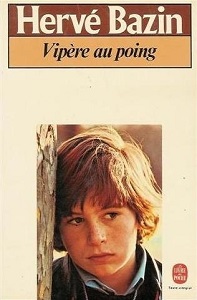
Hervé Bazin (7 april 1911 – 17 februari 1996)
Cover
De Oostenrijkse schrijver Johannes Mario Simmel werd op 7 april 1924 in Wenen geboren. Zie ook alle tags voor Johannes Mario Simmel op dit blog.
Uit: Das geheime Brot
„Der Karfreitag ist schon immer ein trauriger Tag gewesen, aber in diesem Jahr war er ganz besonders traurig. Die Bäume und Sträucher blühten, auf den Wiesen verbreitete sich frisches, grünes Gras, und die Sonne schien aus einem wolkenlosen Himmel auf alle Häuser, auf alle Straßen der großen Stadt. Und dennoch hielt eine ungeheure, maßlose Traurigkeit die Menschen gefangen, so daß sie die Blumen nicht sahen und nicht die Spatzen in den rußigen Ästen der Bäume im Park, die hellen Kleider der Frauen nicht und nicht die vielen Geschäfte, in deren Auslagen die kostbarsten Dinge lagen. Die Arbeiter in den Fabriken fühlten, daß ihre Hände schwer waren wie Blei, die Angestellten in den Büros der großen Ämter legten in der Mittagspause ihre bleichen, verzagten Gesichter auf die verschränkten Arme und schliefen vor Müdigkeit ein, und die Bauern auf dem Lande gingen mit großer Bitterkeit im Herzen über ihre gepflügten Felder.
Niemand konnte in diesem Jahre wirklich froh werden. Sogar die Kinder hatten Sorgenfalten auf den Stirnen, und kleine Hunde, die immer vergnügt gewesen waren, schlichen bedrückt herum und wagten kaum mehr zu bellen.
So traurig war alles geworden.
Wer darüber nachdachte, der fand, daß die Menschen deshalb nicht mehr fröhlich zu sein vermochten, weil sie sich fürchteten. Sie fürchteten sich vor der Zukunft und vor allem, was diese Zukunft bringen sollte an Gewalttat, neuerlicher Zerstörung,
Rechtlosigkeit, Schmerz und Tod. Sie fürchteten sich nicht nur in der großen Stadt Wien, in der die Geschichte, die hier erzählt werden soll, spielt, sondern auch in allen anderen Städten des Kontinents, auf allen Kontinenten, auf der ganzen Welt. Es gab niemanden, der sich nicht gefürchtet hätte.
Tag für Tag, Stunde um Stunde überschwemmte eine Flut von Nachrichten die Erde, die geeignet war, neue Furcht, neuen Schrecken in den Herzen der Menschen zu wecken.
In Europa, dessen Gesicht noch die frischen Wunden eines grauenhaften Vernichtungskrieges trug, standen Soldaten vieler Nationen Gewehr bei Fuß und wären gerne zu Hause gewesen. Sie beargwöhnten und mißtrauten einander, und ihre Führer, die gekommen waren, um ein besiegtes Volk zu befrieden, sprachen von Krieg. In Palästina töteten die Araber täglich viele Juden, und die Juden überfielen täglich arabische Siedlungen. Und beide riefen die Weltöffentlichkeit zum Zeugen ihres gerechten Kampfes an. In Italien schossen Arbeiter ebenso aufeinander wie in der Tschechoslowakei und auf dem Balkan.“
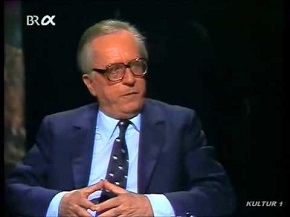
Johannes Mario Simmel (7 april 1924 – 1 januari 2009)
De Antilliaans-Nederlandse dichter en kunstenaar Quinsy Gario (ook bekend onder het pseudoniem T. Martinus) werd geboren in Curaçao op 7 april 1984. Zie ook alle tags voor Quinsy Gario op dit blog.
Uit: Pepernoot (Column)
“Een van de opvallendste kenmerken van de pepernoot is dat hij vaak wordt verward met de kruidnoot. Hij wordt niet herkend voor wat hij is. Als je ‘pepernoot’ googelt, levert dat negen van de tien keer een afbeelding van een kruidnoot op. Het woord pepernoot rolt in de volksmond kennelijk gemakkelijker over de tong dan het woord kruidnoot. Het zijn twee verschillende dingen, maar we vinden het gemakkelijker dat onderscheid te laten voor wat het is. De pepernoot is een belangrijk onderdeel van strooigoed. De term strooigoed schept ook de mogelijkheid om niet moeilijk te hoeven doen over wat er wordt gestrooid in de dagen van gladde fietspaden en warme jassen. Goed wordt door de lucht geslingerd en handjes grijpen boven hun hoofd om te vangen wat ze kunnen. Daarachter staan ouders, om de bezitters van die handjes te vertellen dat ze geen pepernoten van de grond moeten eten. Je ziet die ouders praten en beseft dat ze dat zelf ook ooit te horen hebben gekregen van hun ouders, en die weer van hun ouders.
Het strooien met snoep zou een verwijzing zijn naar de wil om een zoete toekomst te oogsten. We herinneren onszelf eraan dat we een land zijn van boeren en van aandeelhouders. Maar vervoerd worden door suiker, die door de aderen raast en de tongen losmaakt om nog meer te wensen, nog meer te eisen, is een koud kunstje als slechts de schaduwen te zien zijn van de mensen van wier werk die suiker een erfenis is. Knusse voorstellingen worden ons voorgeschoteld alsof ze de normaalste zaak van de wereld zijn. Maar dat is net als de plant, die zich niet afvraagt waarom hij zo sterk heeft kunnen groeien. Hij is groot en werpt vruchten af; wat daaraan vooraf is gegaan, blijft verscholen.”
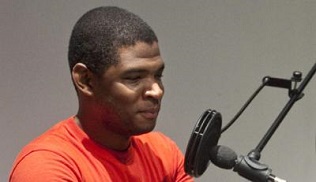
Quinsy Gario (Curaçao, 7 april 1984)
De Argentijnse schrijjfster Victoria Ocampo werd geboren op 7 april 1890 in Buenos Aires. Zie ook alle tags voor Victoria Ocampo op dit blog.
Uit:Autobiografia II
“As. always, I am writing you to complain and say that life is stupid, the world injust, destiny blind, “society” idiotic, and nothing more . . . I have almost everything anyone could want, but one thing disturbs me: intelligence. Bete oU ange; I can accept one or the other. But I cannot accept having paws and wings at the same time. And that is my problem. . . . If God exists, why is He so cruel? Why impose on someone a battle between head and heart? Why a power to reason and an intensity of contradictory emo- tions?”
(…)
“I do not believe that there is any European country in which the bonds of blood and passions of the soul reach such a degree of intensity as is habitual in Hispanic America. Thus, an atmosphere of tension, of latent trag- edy, that disconcerts the foreigner and causes him to conjecture aimlessly about its nature. The spirit and the intellect (I distinguish between the two) count relatively little alongside those deep, dark, heavy and opaque things, which are often unintelligible and thus inexpressable, and from which one cannot extricate oneself. (I do not refer to Indians or mestizos, but to the whites of Latin America.) I defy someone to prove to me that in Europe-even in Italy-the bonds of family and love have the terrible weight of blood that they have here. The Europeans cannot seem to understand our way of feeling. Much more could be said in this regard.”
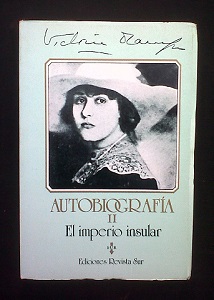
Victoria Ocampo (7 april 1890 – 27 januari 1979)
Cover
De Duitse schrijver, vertaler, anarchistisch politicus en joods denker Gustav Landauer werd geboren in Karlsruhe op 7 april 1870. Zie ook alle tags voor Gustav Landauer op dit blog.
Uit: Aufruf zum Sozialismus
„Wer zum Sozialismus aufruft, muß der Meinung sein, Sozialismus sei eine Sache, die nicht oder so gut wie nicht, noch nicht oder nicht mehr in der Welt sei. Man könnte einwenden: “Natürlich ist kein Sozialismus, ist die sozialistische Gesellschaft nicht in der Welt. Sie ist noch nicht da, aber es sind Bestrebungen da, sie zu erreichen; Einsichten, Erkenntnisse, Lehren, wie sie kommen wird.”
Nein, nicht so ist der Sozialismus gemeint, zu dem hier aufgerufen wird. Vielmehr verstehe ich unter Sozialismus eine Tendenz des Menschenwillens und eine Einsicht in Bedingungen und Wege, die zur Erfüllung führen. Und allerdings sage ich: so gut wie gar nicht, so schlecht wie nur je ist dieser Sozialismus da. Darum rede ich zu jedem, der mich hören will, und hoffe, daß meine Stimme schließlich auch zu manchen, zu vielen dringt, die mich nicht hören wollen, rufe ich auf zum Sozialismus.
Was ist er? Was wollen die Menschen, die Sozialismus sagen?
Und was ist das, was sich heute so nennt? Unter welchen Bedingungen, in welchem Moment der Gesellschaft – wie man gewöhnlich sagt, der Entwicklung – kann er Wirklichkeit werden?
Der Sozialismus ist ein Bestreben, mit Hilfe eines Ideals eine neue Wirklichkeit zu schaffen. Das muß zunächst gesagt werden; wenn auch das Wort Ideal durch traurige Heuchler und gemeine Schwächlinge, die sich gern Idealisten nennen, und sodann durch Philister und Wissenschaftskrämer, die sich gern Realisten nennen, in Verruf gekommen ist. In Zeiten des Niedergangs, der Unkultur, der Geistlosigkeit und des Elends müssen die Menschen, die nicht bloß äußerlich, sondern vor allem innerlich unter diesem Zustand, der sie umgibt und bis in ihren Kern, in ihr Leben, in ihr Denken, Fühlen und Wollen sie selber erfassen will, leiden, müssen die Menschen, die sich dagegen wehren, ein Ideal haben.“
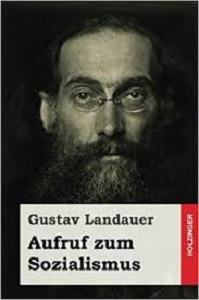
Gustav Landauer (7 april 1870 – 2 mei 1919)
Cover
De Franse schrijfster en strijdster voor vrouwenrechten Flora Tristan werd geboren op 7 april 1803 in Parijs. Zie ook alle tags voor Flora Tristan op dit blog.
Uit: l’Union Ouvriere (Vertaald door Doris en Paul Beik)
“Believing that woman, because of her structure, lacked strength, intelligence, and ability and was unsuited for serious and useful work, it has been concluded very logically that it would be a waste of time to give her a rational, solid, strict education capable of making her a useful member of society. Therefore she has been raised to be an amiable doll and a slave destined to entertain her master and serve him. To be sure, from time to time a few intelligent and compassionate men, suffering for their mothers, wives, and daughters, have cried out against such barbarousness and absurdity and have protested energetically against so unjust a condemnation. . . . Occasionally society has been momentarily sympathetic; but, under the pressure of logic it has responded: Well! Granted that women are not what the sages thought, suppose even that they have a great deal of moral force and much intelligence; well, in that case what purpose would it serve to develop their faculties, since they would have no opportunity to employ them usefully in this society that rejects them? What more frightful punishment than to feel in oneself the strength and ability to act and to see onese condemned to inactivity!
That reasoning was truly irrefutable. Consequently everyone repeats: It is true, women would suffer too much if their fine faculties endowed by God were developed, if from childhood they were raised in such a way that they comprehended their dignity as human beings and were aware of their value as members of society; never, no never, could they support the degrading position in which the church, the law, and prejudices have placed them. It is better to treat them as children and leave them in ignorance about themselves; they would suffer less.
Pay attention and you will see what frightful perturbations result solely from the acceptance of a false principle.
Not wishing to wander from my subject, although here is a good opportunity to speak from a general point of view, I return to my theme, the working class.”
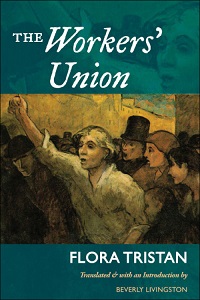
Flora Tristan (7 april 1803 – 14 november 1844)
Cover Engelstalige uitgave
De Canadese schrijver en essayist Roger Lemelin werd geboren op 7 april 1919 in Quebec. Zie ook alle tags voor Roger Lemelin op dit blog.
Uit: Fantaisies sur les péchés capitaux
“Un élixir qui fait posséder une vierge… Les mots bourdonnent, triomphants, au-dessus du sommeil calme de maman. Une détente. Ghislaine se réfugie sur mon cœur. Ses petits sanglots font que sa tête heurte ma poitrine. Elle pleure et semble vouloir aspirer d’un seul trait la force immense qui repose entre mes épaules d’homme sain.
Quelle douceur ! Maman dort. Je ne puis la réveiller pour lui faire boire cet élixir. Vive la douleur qui me rend Ghislaine moins farouche! C’est tout son corps qui finit de sangloter contre moi maintenant. Sa robe est blanche. Mon bras s’enfonce mollement dans le creux de ses reins et le reste ondule sous je ne sais quelle brise fraîche. Nous marchons. Le banc de granit est là, toujours. Je ne pense plus aux pierres tombales, mais à des rochers moussus. Je m’étends et Ghislaine m’imite, sans pudeur, comme si elle se mettait à genoux. Je nous sens tomber dans un gouffre de volupté, où les fièvres nous traversent comme des sources chaudes.
Les muguets, les trèfles, me semblent grandir jusqu’au ciel, fleurs immenses dans un jardin merveilleux. Les arbres, trop grands, se sont soumis le firmament et cela nous fait un ciel clignotant et vert. La nature se gonfle avec nous, grisée par notre folie. »
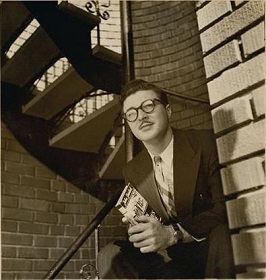
Roger Lemelin (7 april 1919 – 16 maart 1992)
In 1946

